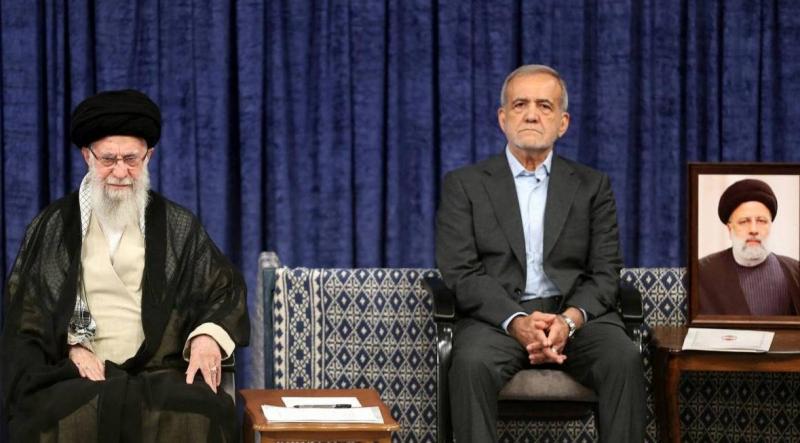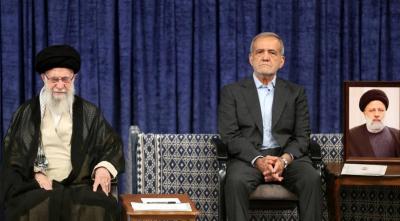Iran issued new escalation messages on Saturday, having separated its response to Israel from a potential ceasefire agreement in Gaza. Western reports indicated that Arab and European nations are racing against time to finalize a ceasefire agreement in Gaza to avoid an Iranian response to Israel.
During the night from Friday to Saturday, Iran's mission to the United Nations stated that "Iran's right to legitimate defense is unrelated to the ceasefire in Gaza." These developments come at a time when Saudi Arabia has reiterated its rejection of escalation and its non-involvement or participation in any military actions between the two parties, calling for all parties to de-escalate.
Iran claims that its senior leaders, including President Pashakian, agree on taking revenge against Israel.
The Iranian mission stated, "Reaching a permanent ceasefire in Gaza is our priority," adding, "Any agreement accepted by Hamas will be acceptable to us." The mission clarified that "Israel has violated Iran’s national security, which has the right to legitimate defense, and this is unrelated to the ceasefire in Gaza, but we hope our response will come in a timely manner and in a way that does not harm any potential ceasefire."
On the night of Thursday to Friday, the United States, Egypt, and Qatar, which mediates between Israel and Hamas, issued a statement urging for the resumption of talks to achieve a ceasefire in Gaza on August 15 in Doha or Cairo "to close all remaining gaps and start implementing the agreement without delays." In response to reports of exchanges of messages and warnings between Washington and Tehran, the mission said, "There have always been direct and intermediary official channels to transmit messages between Iran and the United States, and both parties prefer to keep the details undisclosed."
Regarding the absence of divisions within Iran, nine days after the assassination of Haniyeh in Tehran, the Iranian Revolutionary Guard sought to project a unified stance about taking revenge on Israel.
Tasnim news agency reported that an undisclosed source denied any disagreements among senior Iranian officials regarding the issue of revenge on Israel. The agency affiliated with the Revolutionary Guard claimed that "Israeli media is conducting a false psychological campaign about the existence of disputes among senior Iranian officials, including President Pashakian and the Revolutionary Guard, concerning revenge on Israel after the assassination of Haniyeh."
The source noted, "There is no difference in this matter (revenge) at the strategic level of the system, but rather an unprecedented will, consensus, and agreement among the country’s officials over the past years to implement this action." The source added, "The way to carry out this action is being decided at the highest levels within the Supreme National Security Council, which is also headed by the President."
The Telegraph indicated that Iranian President Masoud Pashakian is engaged in a struggle with the Revolutionary Guard to prevent a full-scale war with Israel. The newspaper mentioned that "Pashakian proposed targeting Israeli bases belonging to Mossad and Israeli intelligence in neighboring countries to Iran (such as Azerbaijan or Iraqi Kurdistan), informing those countries about the strike, which reduces the chances of igniting conflict and avoids dire consequences."
General Ali Fadawi, deputy commander of the Revolutionary Guard, emphasized that "the Guard is the one who will execute the orders of the Leader regarding revenge for Haniyeh." He confirmed that Khamenei's orders will be implemented to the best of their ability, stating that this is Iran's current task.
Ali Shamkhani, advisor to the Iranian leader, announced that Iran has completed "the necessary legal, diplomatic, and media operations to impose severe punishment on Israel." He wrote on X that "Israel seeks war and to disrupt ceasefire negotiations."
Tehran's Friday prayer leader, Ahmad Khatami, stated that revenge on Israel is inevitable. Tasnim quoted him saying, "Israel knows that we will avenge." However, Khatami indicated that "the system in Iran is wise and recognizes when, where, and how to carry out the strikes, and Israel must live in fear until then."
In this context, the Kayhan newspaper, close to Leader Ali Khamenei, boasted about "the world's ignorance of how Iran will respond." In an article penned by its "political editor," it stated that "the terror and fear felt by Israel is due to its ignorance of how Iran will take revenge."
The Iranian newspaper quoted from Israeli sources that Iranians are conducting psychological warfare and mentioned that "the Israeli army is caught in a war of attrition." It continued, "Iranians enjoy creating tension and anxiety to the point of terror in Israel because they are making a strategic impact without firing a single bullet."
The newspaper claimed that "Iranian leaders, Hezbollah, and Hamas have succeeded in winning the war" because "Iranian media deceives everyone." Nevertheless, Revolutionary Guard spokesman Brigadier General Mohammad Ali Naqdi believed that Israel "is trying to conduct a psychological operation through terrorist acts."
Ali Naqdi stated, according to Mehr news agency: "The enemy is conducting a hybrid war against Iran in the economic, political, psychological, and cultural dimensions, and the most important arena in this war is knowledge." He continued, "In the recent terrorist operations in our country and Lebanon, as well as the earlier assassination of Zahidi, we faced a continuous psychological operation."




